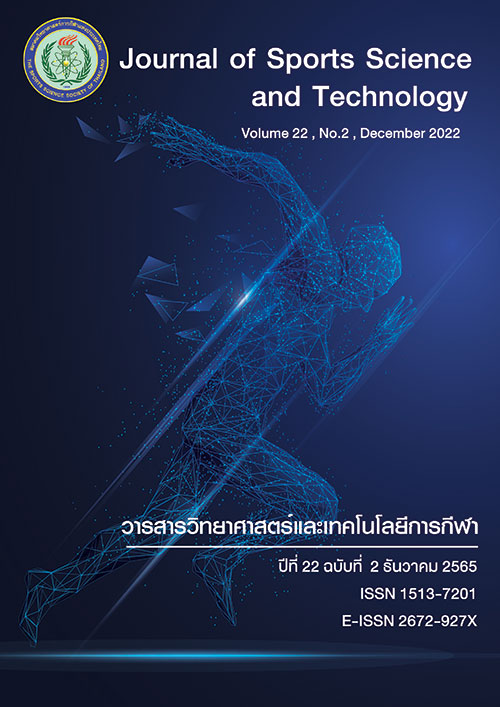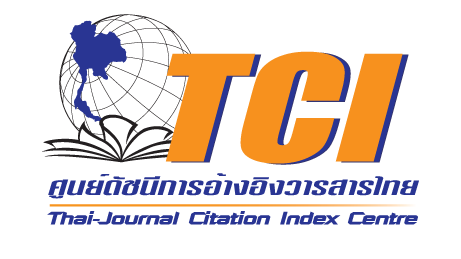THE BCG ECONOMY MODEL AND ITS APPLICATION FOR SPORTS EVENT MANAGEMENT IN THAILAND
DOI:
https://doi.org/10.14456/jsst.2022.12Keywords:
ECG Economy Model, Sports Management, Sports Event, Sport Touirs, Sustainable DevelopmentAbstract
In the past times, Thailand’s economic and social development has created social inequality, income disparity, and natural resource degradation. As such, the limitative economic growth has therefore pushed Thailand into a middle-income trap country. To resolve such problems, during the past few years, a concept related to the BCG economy model, as a tool for national economic and societal development to accomplish inclusive and sustainable growth, has publicly been mentioned in Thai society. Although the model acts as a national agenda with the focus on the agriculture and food industry, energy and material sector, medical services, and tourism industry, its understandings, and linkages to the sports industry, as a part of tourism, stakeholders are vague due to its policy newness and absence of academic evidence. To bridge the knowledge paucity in the literature, this article proposes the BCG Blueprint as a practical tool for BCG conceptual application for sports event management as a component of sports tourism. Policy implications deriving from the blueprint are presented at end of the article for sustainable sports event management in Thailand.
(Journal of Sports Science and Technology 2022; 22 (2): 13-31))
(Received: 29 April 2022, Revised: 17 August 2022, Accepted: 9 September 2022)
Keywords: BCG Economy Model/ Sports Management/ Sports Event, Sports Tourism/ Sustainable Development
*Corresponding Author: Thanavutd CHUTIPHONGDECH
Sports Management Program, Faculty of Sports Science, Chulalongkorn University
E-mail: Thanavutd.C@chula.c.th
References
The Office of National Higher Education Science Research and Innovation Policy Council. BCG model booklet. Bangkok: NXPO; 2020.
The Office of National Higher Education Science Research and Innovation Policy Council. BCG in action: The new sustainable growth engine Bangkok: NXPO; 2019.
The Office of National Higher Education Science Research and Innovation Policy Council. White paper: BCG in action. Bangkok: NXPO; 2018.
Bank of Thailand. Revitalising Thailand’s tourism sector. Bangkok: BOT; 2021.
National Science and Technology Development Agency. BCG in action: Tourism and creative economy. Bangkok: MHESI; 2021.
Ministry of Tourism and Sports. Sustainable tourism strategic plan: Clean tourism to BCG in action 2021-2022. Bangkok: Office of the Permanent Secretary Ministry of Tourism and Sports; 2021.
Sangchumnong A, Kozak M. Impacts of tourism on cultural infiltration at a spiritual destination: A study of Ban Wangka, Thailand. Int J Cult Tour Hosp. Res.2021;15:477-93.
Ministry of Higher Education S, Research and Innovation. BCG in action plan BE 2021-2027. Bangkok: MHESI; 2022.
Chutiphongdech T, Ploychankul C, Chumnanont C. An analysis of dark green ecotourist demand using value proposition canvas. Chulalongkorn Business Review. 2021;43:22-37.
Cheablam O, Shrestha RP. Climate change trends and its impact on tourism resources in Mu Ko Surin Marine National Park, Thailand. Asia Pac J Tour Res. 2015;20:435-54.
Azam M, Mahmudul Alam M, Haroon Hafeez M. Effect of tourism on environmental pollution: Further evidence from Malaysia, Singapore and Thailand. J Clean Prod. 2018;190:330-8.
Mostafanezhad M. The materiality of air pollution: Urban political ecologies of tourism in Thailand. Tourism Geographies. 2021;23:855-72.
Cordina R, Gannon MJ, Croall R. Over and over: Local fans and spectator sport tourist engagement. Serv Ind J. 2019;39:590-608.
Tourism Authortiy of Thailand. In-depth anaylsis of tourist behavior for 2016. Bangkok: In-Touch Research & Consultancy; 2016.
Ritchie B, Mosedale L, King J. Profiling sport tourists: The case of super 12 rugby union in the Australian Capital Territory, Australia. Curr Issues Tour. 2002;5:33-44.
Gibson HJ. Sport tourism: A critical analysis of research. Sport Manag Rev 1998;1:45-76.
Alexandris K, Kaplanidou K. Marketing sport event tourism: Sport tourist behaviors and destination provisions. Sport Mark Q. 2014;23:125.
Jiménez-García M, Ruiz-Chico J, Peña-Sánchez AR, López-Sánchez JA. A bibliometric analysis of sports tourism and sustainability (2002–2019). Sustainability. 2020;12:1-18.
United Nations World Tourism Organization. Sport tourism and sustainable development goals (SDGs). 2019 [cited 2022 June 12]. Available from: https://webunwto.s3.eu-west-1.amazonaws.com/s3fs-public/2019-09/sporttourismandsdgs.pdf.
Statista. Sport events worldwide. 2022 [cited 2022 June 12]. Available from: https://www.statista.com/outlook/dmo/eservices/event-tickets/sport-events/worldwide.
Loiseau E, Saikku L, Antikainen R, Droste N, Hansjürgens B, Pitkänen K, et al. Green economy and related concepts: An overview. J Clean Prod. 2016;139:361-71.
Korhonen J, Honkasalo A, Seppälä J. Circular Economy: The concept and its limitations. Ecol Econ. 2018;143:37-46.
D'Amato D, Droste N, Allen B, Kettunen M, Lähtinen K, Korhonen J, et al. Green, circular, bio economy: A comparative analysis of sustainability avenues. J Clean Prod. 2017;168:716-34.
Bugge MM, Hansen T, Klitkou A. What is the bioeconomy? A review of the literature. Sustainability. 2016;8:1-22.
Kanchanangkul D. Economic development in Thailand: Success or failure. Journal of Economics. 1996;1:40-54.
Kaosa-ard M. Economic development and institutional failures in Thailand. TDRI Quarterly Review. 1998;13:3-11.
Jomo KS, Chung CY, Folk BC, Phongpaichit P, Simatupang B, Tateishi M. Southeast Asia's misunderstood miracle: Industrial policy and economic development in Thailand, Malaysia and Indonesia: Routledge; 2019.
Ministry of Industry. Prior to Thailand 4.0. 2017 [cited 2022 June 12]. Available from: https://gnews.apps.go.th/news?news=2530.
Krongkaew M, Kakwani N. The growth–equity trade-off in modern economic development: The case of Thailand. J Asian Econ. 2003;14:735-57.
National Science and Technology Development Agency. Bio economy. Bangkok: NSTDA; 2018.
National Science and Technology Development Agency. Green economy. Bangkok: NSTDA; 2019.
Pearce D, Markandya A, Barbier E. Blueprint 1: For a green economy: Routledge; 2013.
UNEP. Towards a green economy: Pathways to sustainable development and poverty eradication - A synthesis for policy makers. France: United Nations Environment; 2011.
United Nations. Transforming our world: The 2030 agenda for sustainable development: United Nations; 2015.
Ministry of Industry. Bio-Circular-Green economy: BCG model in action. 2021 [cited 2022 June 12]. Available from: https://www.ftpi.or.th/2021/59799.
Kucukvar M, Kutty AA, Al-Hamrani A, Kim D, Nofal N, Onat NC, et al. How circular design can contribute to social sustainability and legacy of the FIFA World Cup Qatar 2022™? The case of innovative shipping container stadium. Environ. Impact Assess. Rev. 2021;91:1-14.
Trail GT, McCullough BP. Marketing sustainability through sport: Testing the sport sustainability campaign evaluation model. Eur Sport Manag Q. 2020;20:109-29.
Lauermann J. Visualising sustainability at the Olympics. Urban Studies. 2020;57:2339-56.
Chutiphongdech T, Kampitak T. A systematic review of the key success factors of sports event management: A resource-based view approach. Ann Appl Sport Sci. 2022;in press:1-10.
Gibson H. Sport tourism: Concepts and theories. An introduction. Sport in Society. 2005;8:133-41.
Jensen CT. Local sport event policies and sustainability: A puzzle approach. Front Sports Act Living. 2021;3:1-13.
Bianchini A, Rossi J. Design, implementation and assessment of a more sustainable model to manage plastic waste at sport events. J Clean Prod. 2021;281:1-26.
Kim H-D. The 2012 London Olympics: Commercial partners, environmental sustainability, corporate social responsibility and outlining the implications. Int J Hist Sport. 2013;30:2197-208.







